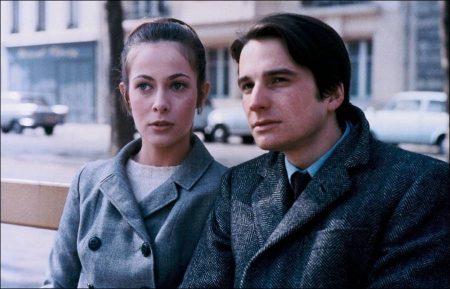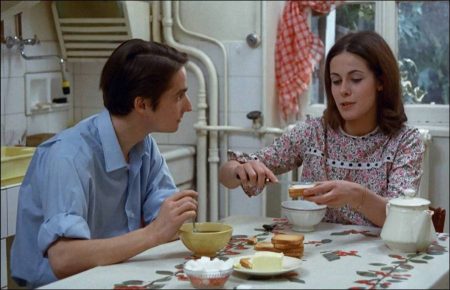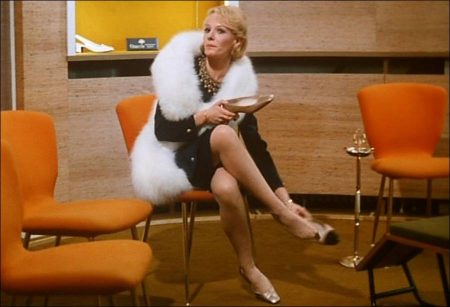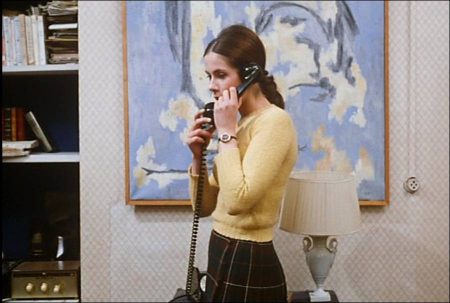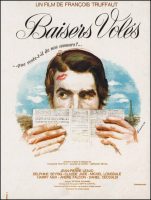Taglines: Antoine knows what he wants to do…his problem is doing it
Stolen Kisses movie storyline. After being discharged from the army for insubordination, Antoine Doinel visits his former girlfriend Christine Darbon, and her father finds a temporary job of night watchman for Antoine in a hotel. The naive Antoine is deceived by a private eye in his first night shift, and fired on the next morning.
The investigator invites the clumsy Antoine to work in his company, where he is assigned for some minor jobs, until he has to investigate why the owner of a shoes store, Mr. Georges Tabard, is detested by his employees. Meanwhile Antoine falls in love for the gorgeous Mrs. Fabienne Tabard.
Stolen Kisses (French: Baisers Volés) is a 1968 French romantic comedy-drama film directed by François Truffaut starring Jean-Pierre Léaud and Claude Jade. It continues the story of the character Antoine Doinel, whom Truffaut had previously depicted in The 400 Blows and the short film Antoine and Colette. In this film, Antoine begins his relationship with Christine Darbon, which is depicted further in the last two films in the series, Bed & Board and Love on the Run.
The original French title of the film comes from a line in Charles Trenet’s song “Que reste-t-il de nos amours ?” which is also used as the film’s signature tune. The film was nominated for Academy Award for Best Foreign Language Film. Starring are Jean-Pierre Léaud, Claude Jade, Daniel Ceccaldi, Claire Duhamel, Delphine Seyrig, Michael Lonsdale, Harry-Max, André Falcon, Catherine Lut, Martine Ferrière and Jacques Rispal.
The film begins with a pan onto the locked gates of the Cinémathèque Française then based at the Palais du Chaillot. On the gates there is a sign ‘Relache’ (‘Closed’). This is Truffaut’s reference to the Affaire Langlois when the head of the Cinémathèque had been sacked by the French government. He was eventually reinstated after filmmakers like Truffaut used all their wiles to foment protest.
About the Story
There are many continuations from The 400 Blows; discharged from the army as unfit, Antoine Doinel seeks out his sweetheart, violinist Christine Darbon. He has written to her voluminously (but, she says, not always nicely) while in the military. Their relationship is tentative and unresolved.
Christine is away skiing with friends when Antoine arrives, and her parents must entertain him themselves, though glad to see him. After she learns that Antoine has returned from military service, Christine goes to greet him at his new job as a hotel night clerk. It is a promising sign that perhaps this time, the romance will turn out happily for Antoine. He is, however, quickly fired from the hotel job. Counting the army, Antoine loses three jobs in the film, and is clearly destined to lose a fourth, all symbolic of his general difficulty with finding his identity and “fitting in”.
Later, Christine attempts to guess Antoine’s third job, amusingly tossing out guesses like sheriff or water taster. Finally, his job as a private detective is revealed. Throughout the film, Antoine works to maintain the job, working a case that requires him to pose as a shoe store stock boy. The job separates Antoine from his relationship with Christine.
Soon, he falls for his employer’s attractive (and older) wife, who willingly seduces him. He quarrels with Christine, saying he has never “admired” her. Fired from the detective agency, by the film’s end, Antoine has become a TV repairman. He still avoids Christine, but she wins him back by deliberately (and simply) disabling her TV, then calling his company for repairs while her parents are away. The company sends Antoine, who is once again bumbling and inept, trying for hours to fix a TV with just one missing tube. Morning finds the two of them in bed together.
Stolen Kisses (1968)
Directed by: François Truffaut
Starring: Jean-Pierre Léaud, Claude Jade, Daniel Ceccaldi, Claire Duhamel, Delphine Seyrig, Michael Lonsdale, Harry-Max, André Falcon, Catherine Lut, Martine Ferrière, Jacques Rispal
Screenplay by: François Truffaut, Claude de Givray, Bernard Revon
Production Design by: Claude Pignot
Cinematography by: Denys Clerval
Film Editing by: Agnès Guillemot
Music by: Antoine Duhamel, Charles Trenet
MPAA Rating: None.
Distributed by: United Artists
Release Date: September 4, 1968 (France)
Views: 323
